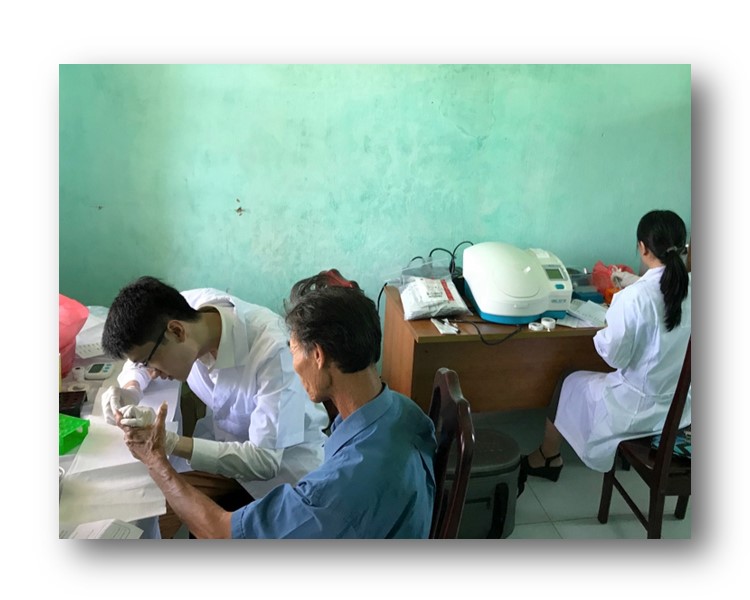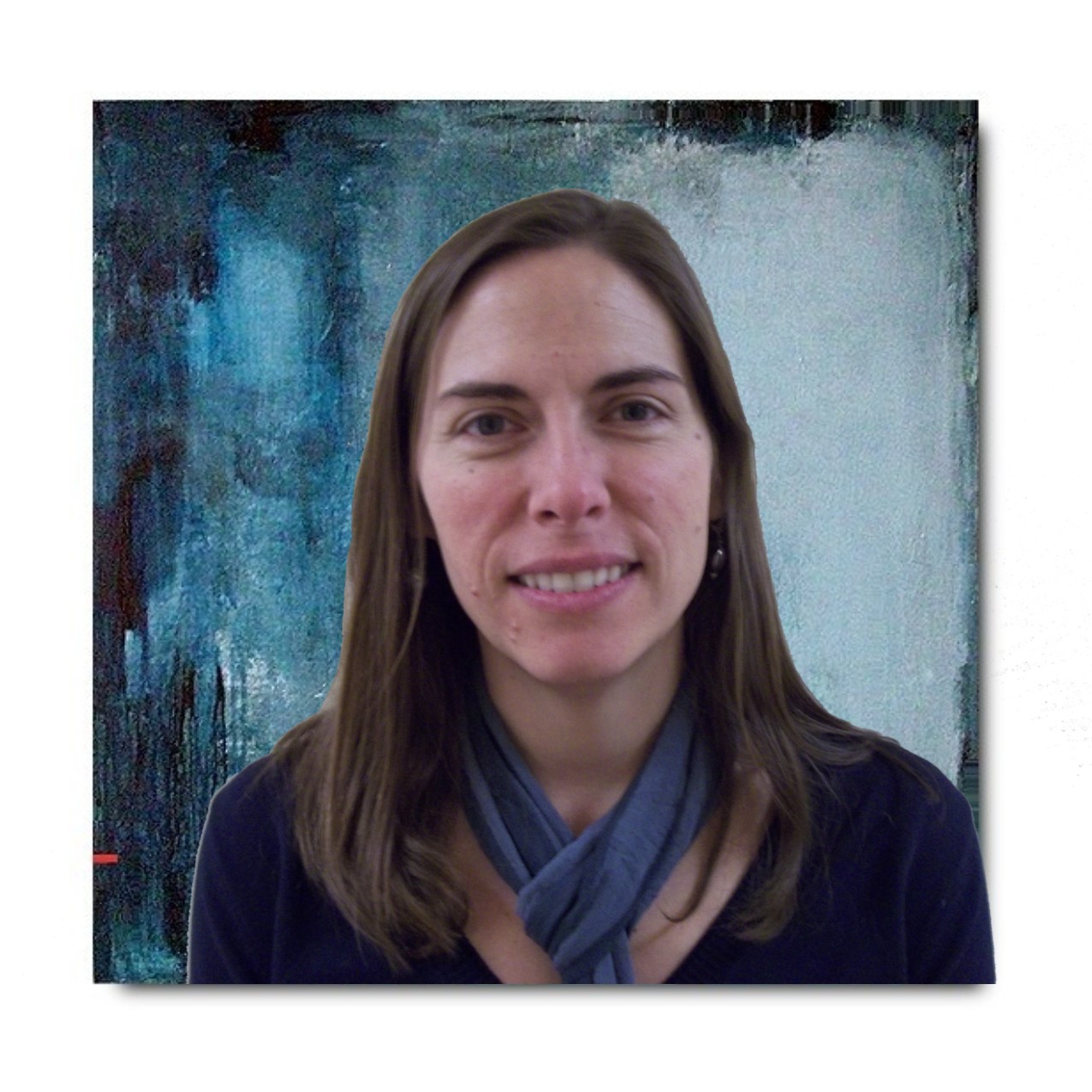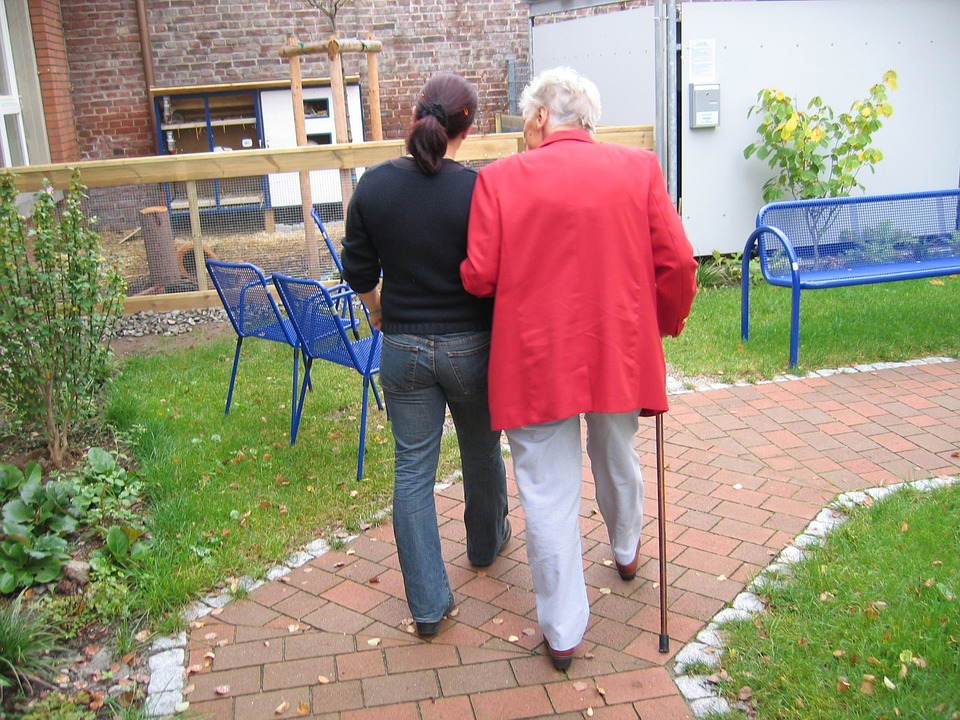Sociologist Network 2019
 Sociology researcher, Bethany Everett, publishes
Sociology researcher, Bethany Everett, publishes
a "first of its kind" study in the Journal of Adolescent Health drawing media attention
Sociologist Network Staff
According to Everett, "the aim of the study was to determine if men who report avoiding adolescent fatherhood through a partner's use of abortion have different socioeconomic outcomes from men who report a live birth during adolescence." The study found that women's use of abortion services were associated withducational benefits for men who report teen pregnancies. The study, published in the Journal of Adolescent Health, is timely given renewed efforts to limit access to abortion, Everett said.
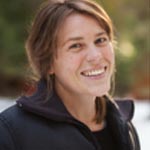
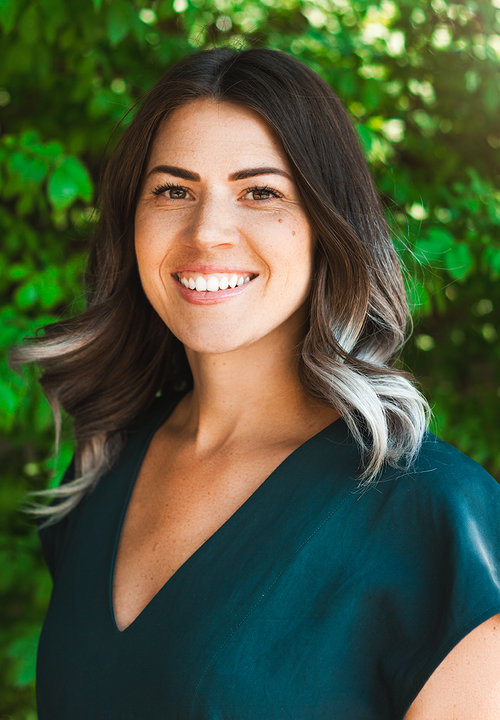
The second author, Dr. Kyl Myers, Research Assistant Professor in the Department of Obstetrics and Gynecology at the U, is a recent PhD graduate of University of Utah's Sociology doctorate program.
Health: University of Utah article
University of Utah sociology researcher will be the first to examine the impact of changes to LGBT-specific policies on pregnant lesbian and bisexual women’s birth outcomes
Sociologist Network Staff
Assistant Professor of Sociology, Bethany Everett has long had an interest in the field of sexual minority health, however, in 2012
she became an National Institutes of Health (NIH) Building Interdisciplinary Research
Careers in Women’s Health Scholar which introduced her to Obstetricians and Maternal-Fetal
Medicine Doctors. 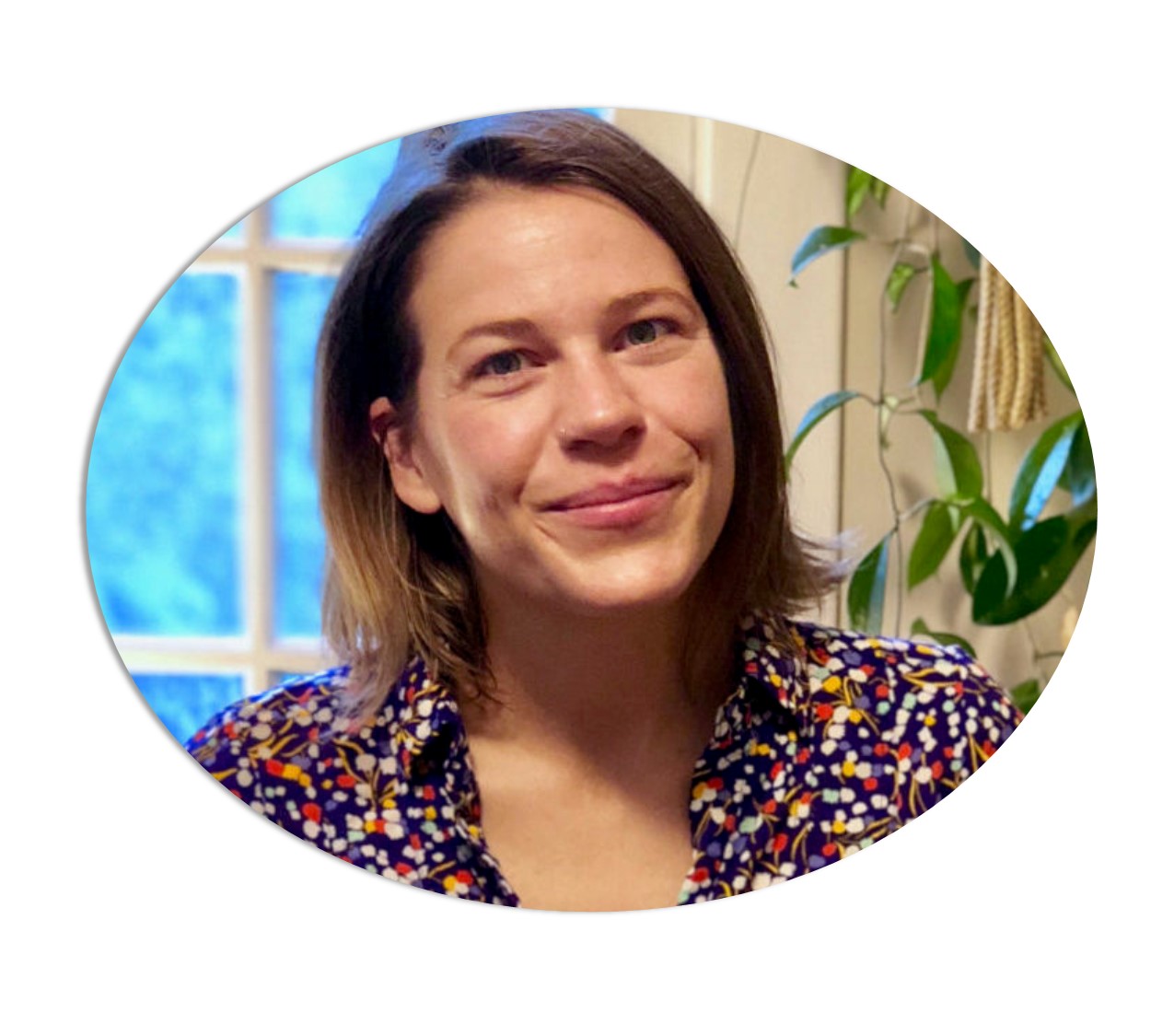
"I found that the same risk factors they were studying in order to improve maternal
and infant health in the general population were often elevated among bisexual and
lesbian women."
Everett noted that while there has been a fair amount of scholarly work that shows
racial discrimination has strongly negative impacts for pregnant women and their infants,
"when I went to the literature, I noticed that no one has really taken a look to
see if the same processes were true for lesbian and bisexual women, who report high
rates of discrimination and victimization. There’s also literature that shows public
policy can impact maternal and infant health, for example, after the Civil Rights
Act, black women’s birth outcomes improved. We know that changes in LGBT-specific
policies can improve the mental health of lesbian, gay and bisexual people, but my
research will be the first to examine the impact on pregnant lesbian and bisexual
women’s birth outcomes."
The study will be funded via a grant from the National Institues of Health.
|
Clinicians collect biomarker data from study participants in the Vietnam Health and
Aging Study |
Kim Korinek, Associate Professor of Sociology |
How has the Vietnam War affected the health of aging populations in Vietnam?
Sociologist Network Staff
Associate Professor of Sociology and Director of the Asia Center at the University of Utah, Kim Korinek is leading an international team of researchers to investigate through a longitudinal study. Funded by a grant from the National Institutes of Health/National Institute on Aging , the Vietnam Health and Aging Study is conducted by an interdisciplinary team of social scientists and health scientists from the University of Utah (UU), USA; Mount Saint Vincent University (MSVU), Canada; the National University of Singapore (NUS); University of Washington, Seattle, USA (UW); Hanoi Medical University (HMU), Vietnam; and the Institute of Family and Gender Studies (IFGS), Vietnam.
The study notes that while the Vietnam war exacted a well-documented severe toll on Vietnamese society, its enduring imacts have largely been examined from American soldiers' perspectives.
In ...Vietnam, where population aging and chronic disease burdens are rapidly rising, aging populations have seen a disproportionate share of armed conflict and related casualties. Yet, war’s enduring impacts in these contexts remain greatly understudied
While there have been some studies of US Veterans that show that the long-term impacts of war do have consequences for aging populations, very few studies have been conducted and so on this topic,
knowledge is strikingly sparse and geographically narrow, deriving mostly from the West, and two groups in particular: US veterans and war refugees.
The Vietnam Health and Aging Study (VHAS), is in the process of better understanding mechanisms of association between diverse exposures to armed conflict during the Vietnam War and multiple dimensions of older adult health among survivors.
The first wave of data collection was conducted in 2018 and second wave of follow-up data collection is scheduled to take place in 2021. The VHAS was conducted in four northern Vietnamese districts that represent a spectrum of war exposure as indicated by intensity of bombings. Additionally, VHAS uses random sampling within gender and military service to permit unique gender-specific analyses of military service, trauma exposure and health.
The VHAS uses face-to-face interviews in which survivors elaborate their war and military service experiences; warzone stressors; and multiple dimensions of health such as chronic disease, functional limitation, disability, health behaviors, cognition and psychological health.
In addition, biomarker data is also collected so that the data includes anthropometric and functional tests such as grip strength, blood pressure, hair samples for cortisol assay, and capillary blood samples to assay C-reactive protein, cholesterol, HbA1c, and other markers of interest for cardiovascular and other disease risks and for testing the impact of early life stressors on later life health. Blood samples will also permit epigenetic analysis of biological aging.
The next phase of the study in progress will be funded via a grant from the National Institues of Health.
How alzheimer's caregivers spend down time may make all the difference in preventing burn-out
Sociologist Network Staff
Nearly 6 million Americans have Alzheimer’s disease and related dementias and the number is growing. Growing along with them are the stress levels of more than 16 million spouses and family members who provide care and support to them on a daily basis. Caregivers can feel burdened beyond their coping resources and may face risks to their own health and financial stability. While a respite from caregiving might seem like the logical need for a person with so many exhausting responsibilities, some research seems to be indicating that respite alone may not be restoring energy and health to caregivers as much as both caregivers and professionals had originally hoped.
Associate Professor of Sociology, Rebecca Utz, through a grant provided by the National Institutes of Health (NIH) will study caregivers testing a method for enhancing the efficacy of their respite time from caregiving.
Our prior researc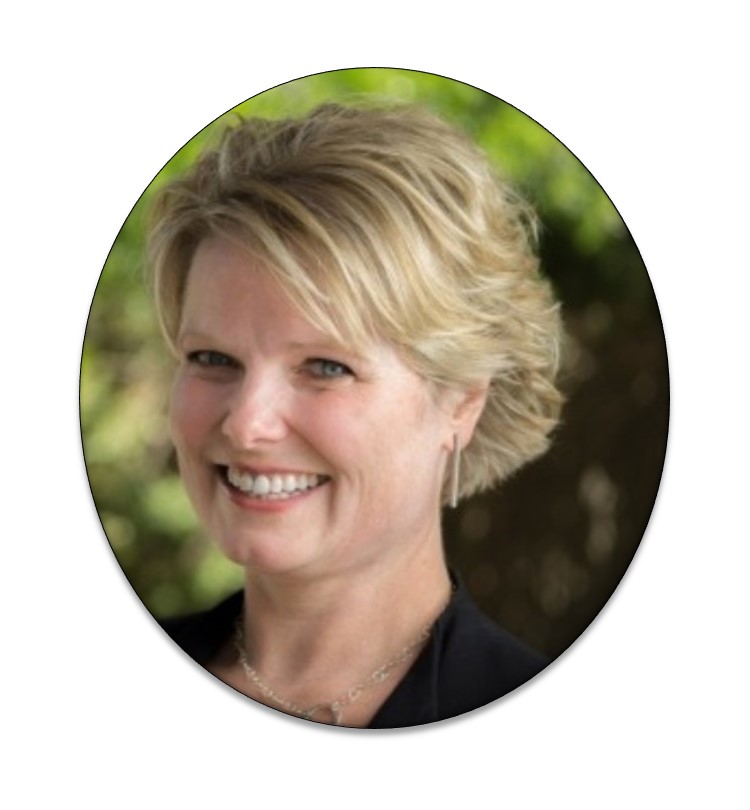 h has found that caregivers often report dissatisfaction with how they spend their
respite time; many reported 'wasting' time doing lower priority activities, instead
of using their respite as a reprieve from their role as vigilant caregivers to pursue
activities that are personally meaningful or rewarding. Those who used respite to
do what they had most desired, needed, or had planned to do had the highest satisfaction
with their time-use and reported the most positive wellbeing over time. These insights
led us to design a behavioral intervention that we believe will maximize positive
outcomes associated with respite services, and will also improve our understanding
of what factors—especially those related to respite time-use—have the potential to
improve, or at least maintain, the wellbeing of family caregivers over time.
h has found that caregivers often report dissatisfaction with how they spend their
respite time; many reported 'wasting' time doing lower priority activities, instead
of using their respite as a reprieve from their role as vigilant caregivers to pursue
activities that are personally meaningful or rewarding. Those who used respite to
do what they had most desired, needed, or had planned to do had the highest satisfaction
with their time-use and reported the most positive wellbeing over time. These insights
led us to design a behavioral intervention that we believe will maximize positive
outcomes associated with respite services, and will also improve our understanding
of what factors—especially those related to respite time-use—have the potential to
improve, or at least maintain, the wellbeing of family caregivers over time.
Utz will test an intervention called Time for Living and Caring (TLC). It's a well-researched model that uses the principles of goal setting and goal review to help caregivers form and reflect on goals for their time away.
The original model needed a number of trained facilitators and 15-20 face to face visits and phone calls to find out how caregivers were doing with the strategy, so the new delivery method well consist of a web-based platform to create more accessibility and to reach more caregivers. Utz hopes it will increase caregivers' well-being by making caregivers more conscious of their ability to achieve personal goals during the time they're relieved from caregiving duties.
The study will be funded via a grant from the National Institues of Health.
University of Utah Sociology is home to "highly productive scholars and committed
teachers"
according to a recent peer review
Sociologist Network Staff
As part of a rigorous review of the University of Utah Sociology Department, external
reviewers noted that:
“[t]he Sociology Department at the University of Utah is fortunate to have many highly
productive scholars and committed teachers, across all ranks (non-tenure track, untenured
faculty, tenured faculty). Faculty have been successful not only in publishing in
many top tier journals, but also in receiving external funding for their research.
According to Academic Analytics, the Department is ranked second (of 201 departments) in articles per faculty and eighth in citations per faculty based on data from 2014-2017. It is above the median in faculty awards and federal grant dollars per faculty. Faculty have received four NIH R01 grants and other significant foundation grants. Fourteen tenure-line faculty and one career-line faculty have received grants in the past seven years. Despite its small size compared to many other sociology departments, this group is very productive."
University of Utah Ph.D. puts sociology into practice investigating housing solutions
for
the City of New York
I started the sociology PhD program the year the focus on population and health was introduced. My dissertation focused on racial disparities in homelessness and place-based effects. My interest in homelessness came from working at a homeless health clinic in downtown Salt Lake before graduate school.
Overall, I am grateful to have had a suppo rtive and innovative advisor who allowed me to mold my graduate experience, very accessible
faculty, and close relationships with many other students who were trying to survive
just like me. One great aspect of the program was having the flexibility to try different
things including taking courses in public policy and public administration. This helped
me keep a foot in the applied world, which was my preferred career path. I also co-founded
a student publication, Social Dialogue, with funding from the U’s Publications Council.
It was an opportunity to create a forum to discuss social issues and for students
to publish. After my fourth year I did an internship with the State of Utah’s State
Community Services Office focusing on homeless services and low income programs, which
evolved into a full time job.
rtive and innovative advisor who allowed me to mold my graduate experience, very accessible
faculty, and close relationships with many other students who were trying to survive
just like me. One great aspect of the program was having the flexibility to try different
things including taking courses in public policy and public administration. This helped
me keep a foot in the applied world, which was my preferred career path. I also co-founded
a student publication, Social Dialogue, with funding from the U’s Publications Council.
It was an opportunity to create a forum to discuss social issues and for students
to publish. After my fourth year I did an internship with the State of Utah’s State
Community Services Office focusing on homeless services and low income programs, which
evolved into a full time job.
Policy and research on homelessness has been my focus while working for the State
of Utah, as a policy director for the National Alliance to End Homelessness in DC,
and now as a researcher for the City of New York. I have been able to influence funding
and policy decisions, program models, and simply what data are tracked based on research
and understanding population and social forces like racism, inequality, and segregation.
For example, I directed a randomized trial of homelessness prevention services for
the State of Utah and found the program was not effectively targeting people most
likely to become homeless, which lead the State to redirect funds to programs helping
currently homeless persons regain housing. In DC I broadened our coalition work to
include organizations and efforts focusing on racism and criminal justice issues.
Currently I am researching trends in homelessness and evaluating the City’s housing
and shelter programs. I rely heavily on the research methods and statistics I learned
from my PhD program.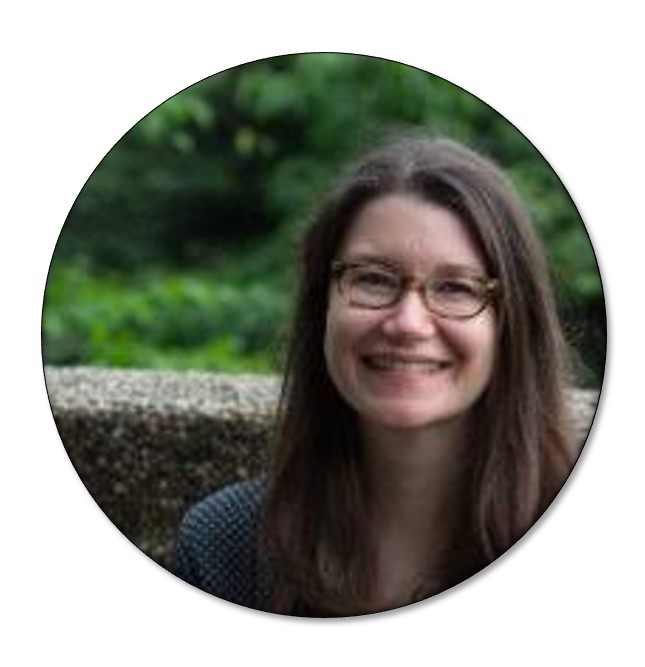
The scale of everything in NYC can be overwhelming, including just my department, but I work with incredibly capable and down-to-earth people and I have a good work-life balance, which is good since I am raising a tiny New Yorker. The best advice I can give a PhD student wanting to find a job outside academia is not to wait until after graduate school to get involved in the work you want to do. Explore types of work environments by interning, volunteering, or finding a part-time or full-time job if you can manage.
University of Utah graduate student engages in participatory action research
to provide youth with critical care - cariño conscientizado -
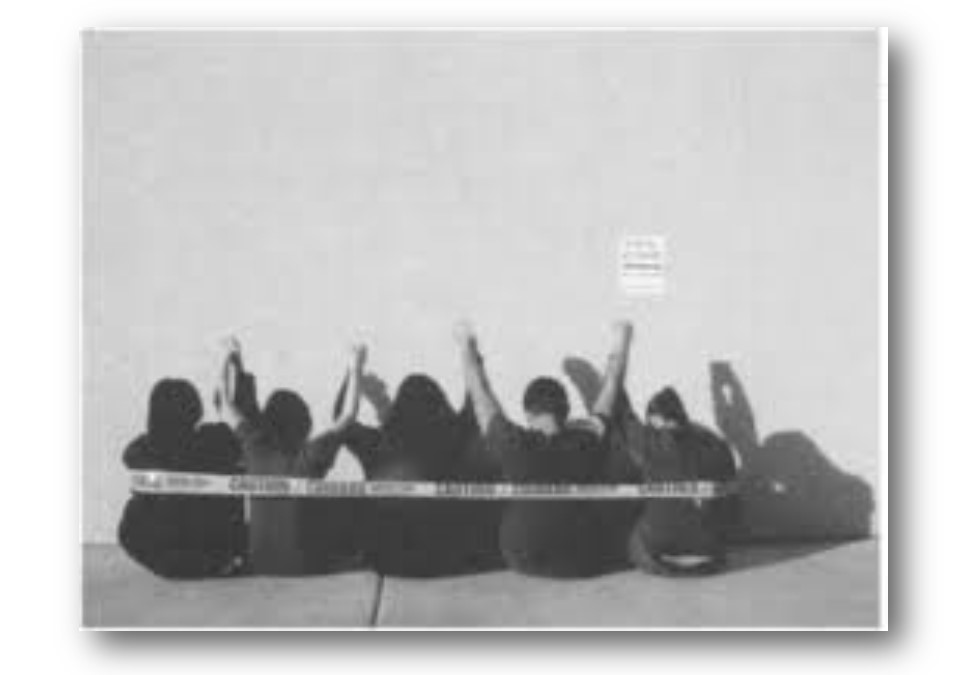
c a u t i o n , w e h a v e p o w e r
photo: Mestizo Arts & Activism Collective
Sociologist Network Staff
In a new study published in Gender and Education, U of U graduate student, Alonso Reyna Rivola worked with an interdisciplinary team creating participatory action research to develop a program designed to provide critical care - 'cariño conscientizado' - to youth of color. The program provided educational settings in which youth could exercise critical and cultural practices using art mediums and through supportive dialogue with educators.
School experiences for undocumented children and children with undocumented family
members face personal risks and social exclusion in many school settings. The new
study set out to test whether an arts based program that incorporated cultural knowledge
from an a youth's 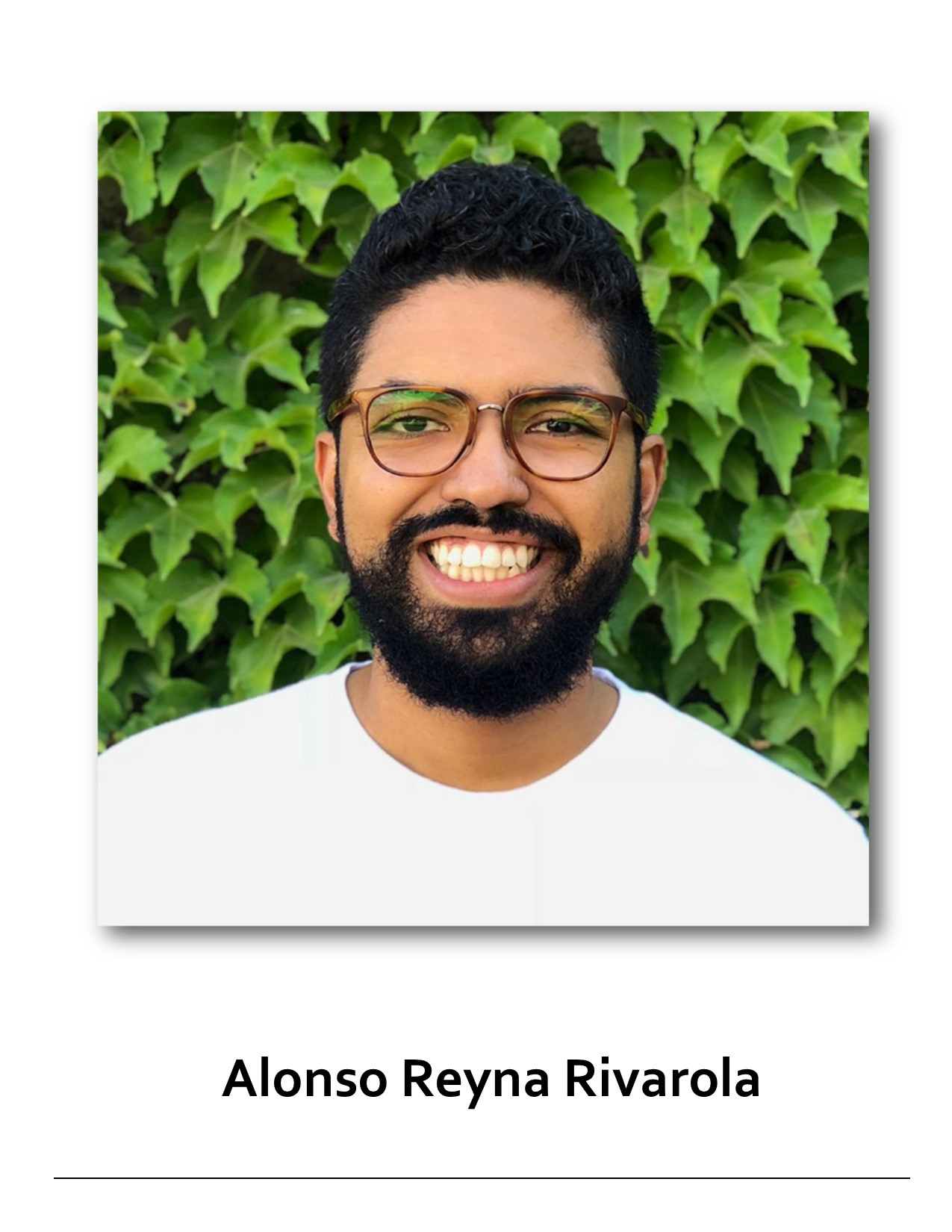 background with opportunities of creative expression and mentoring could help students
strengthen their abilities to face their circumstances with critical analysis and
deeper capacity at cultural production. The program hoped to provide a, shared context for rearticulating undocumented students’ everyday experiences negotiating
the ‘production of illegality’ and racialized exclusions in school.
background with opportunities of creative expression and mentoring could help students
strengthen their abilities to face their circumstances with critical analysis and
deeper capacity at cultural production. The program hoped to provide a, shared context for rearticulating undocumented students’ everyday experiences negotiating
the ‘production of illegality’ and racialized exclusions in school.
The program structure allowed for confronting the dangers of their circumstances in a context of safety and understanding; an opportunity to share experiences with others in similar circumstances may help young people of color overcome the neglect and isolation that may attend school settings.
It is hoped that participatory creative praxes make visible a politics of critical care and new imaginaries for resisting the ‘school-to-sweatshop pipeline’ and that the collective act of art-making generates possibilities to forge solidarities through 'cariño conscientizado', a critically conscious care praxis that seeks to dismantle structural injustices.
The study hopes to initiate raising questions about collective creative praxis as acts of resistance and refusal that take seriously the agency of communities to spark justice for ourselves.
Read the abstract of the article by Alonso Reyna Rivarola here:
Sociology majors turn passions into solutions at Undergraduate Research Day
Sociologist Network Staff
Sociology offers a number of ways students can hone their research skills and test hypotheses rooted in the body of knowledge about society that they gain through courses taken in the Sociology Department.
On April 16, 2019, the College of Social and Behavioral Sciences hosts Undergraduate Student Research Day, held annually, gives both graduate and undergraduate students in the College the opportunity to showcase original research projects using poster presentations. A panel of faculty judges evaluate the projects.
What Research Questions are Undergraduates Asking?
The studies students selected reflect their own questions and interests and gain the tools to more fully investigate their concerns whether they have to do with social experiences of low-income patients at a local free clinic; cross-national attitudes about contraception in the United States and Vietnam; parenting experiences within the LGBTQ community; or tests of women's empowerment on a sustainable farm in India.
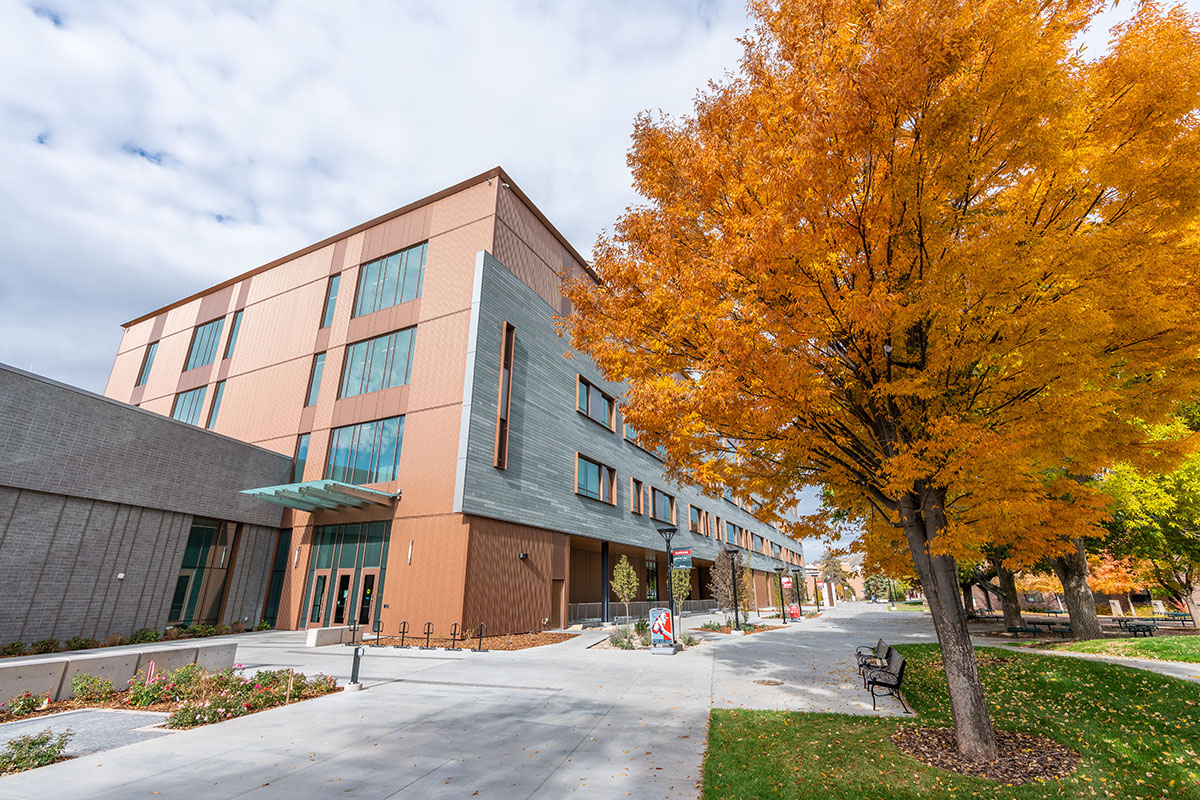 |
|
I started wondering, how welcoming are free clinics to their patients? Does care
begin as soon as patients come through the door? --Noelia Juarez |
Observing Interactions among volunteers and patients at a free clinic: How interactions impact managing versus solving poor health
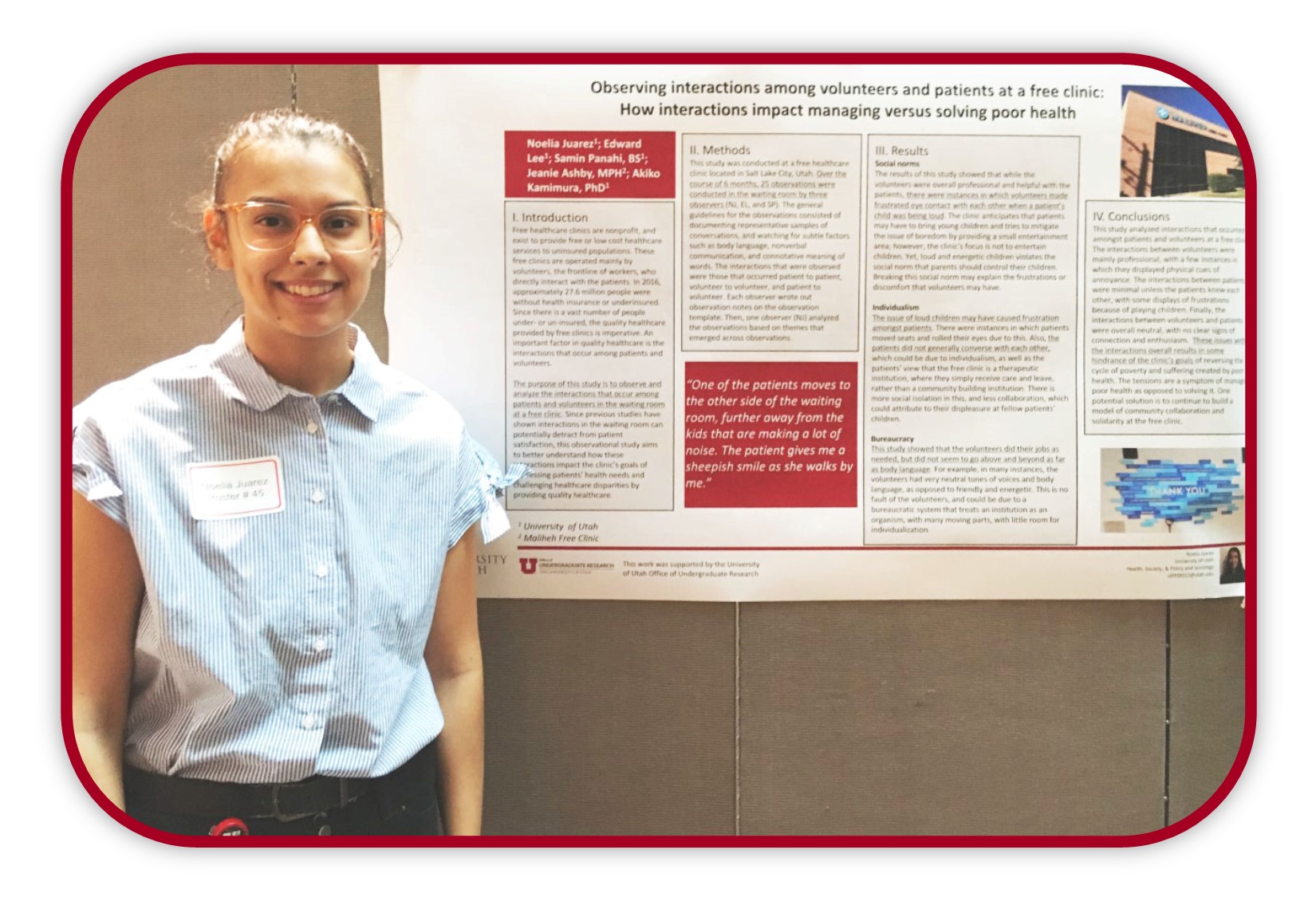
Noelia Juarez became interested in her subject during the course of taking a class with sociology Assistant Professor of Sociology, Akiko Kamimura called “Social Disparities in Health.” Juarez studied alongside students who had opted for the “community engaged learning” version of the course which included research excursions to the Maliheh Free Clinic in Millcreek, Utah. The reports given by students engaging in community research inspired Noelia to devise her own research questions and to enroll in a Senior Thesis project in sociology mentored by Prof. Kamimura. Noelia was interested in the social interactions within the clinic and whether the social environment of the clinic reflects or challenges attitudes about health care access within the broader society. To answer her question, she observed interactions between volunteer staff and patients as well as interactions among patients. Noelia is interested in underlying causes of poor health among low income residents without health insurance.
Knowledge and Perceptions of Reproductive Health Among College Students in Vietnam and the U.S.
Elizabeth Izampuye and Bethany Gull, sociology graduate student 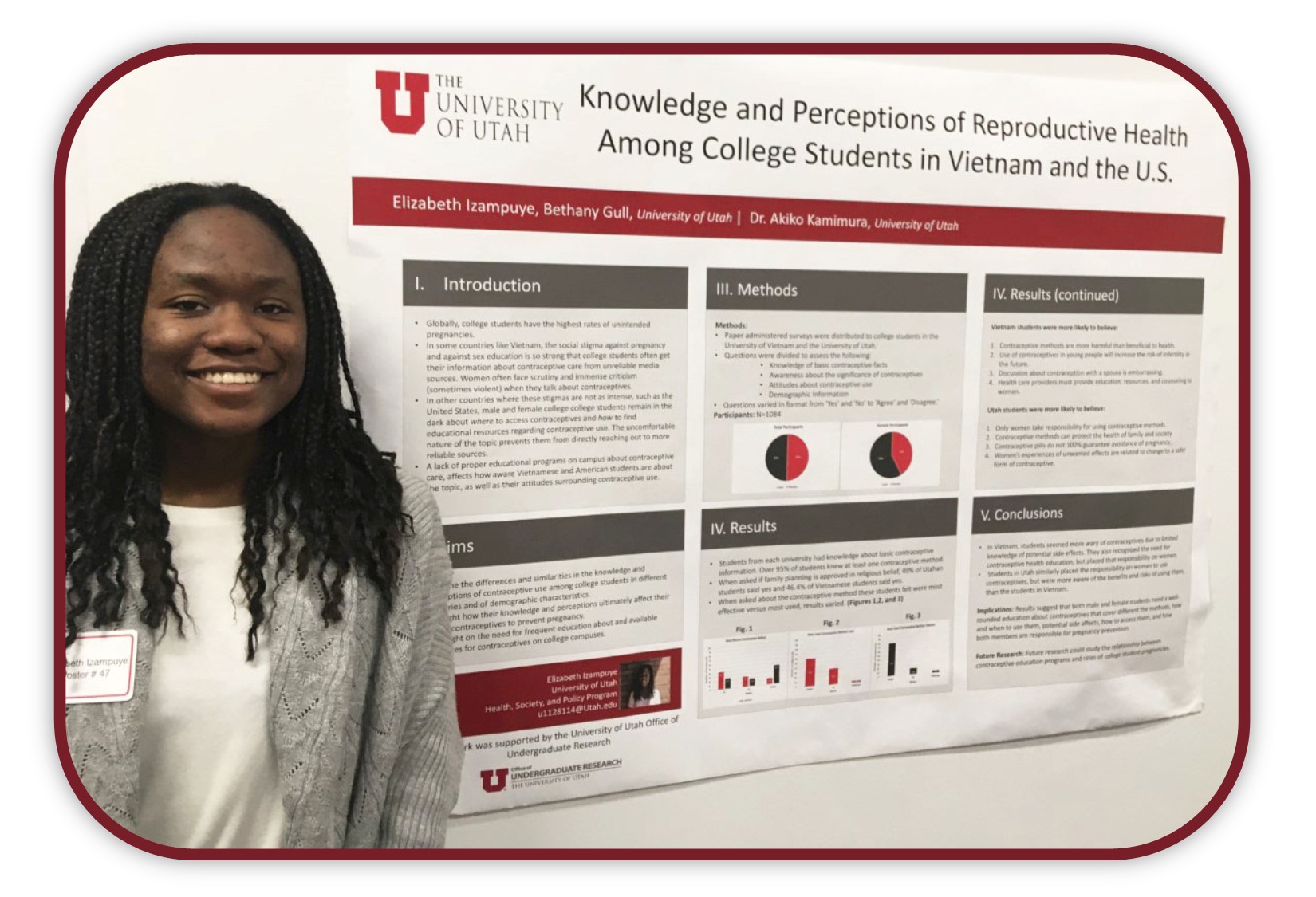
Elizabeth Izampuye together with sociology graduate student, Bethany Gull designed a special project as part of a Sociology Research Methods course taken with
Assistant Professor of Sociology, Akiko Kamimura. Izampuye examined surveys administered to college students in the U.S. and in Vietnam to compare
knowledge and perceptions around reproductive health services.
“In some countries, like Vietnam, the social stigma against pregnancy and against sex education is so stong that college students often get their information about contraceptive care from unreliable media sources. Women often face scrutiny and immense criticism (sometimes violent) when they talk about contraceptives," Izampuye said.
The study suggests that even in other countries where these stigmas are not as intense, such as the United States, male and female college students, nevertheless, remain largely in the dark about where to access contraceptive use. The uncomfortable nature of the topics prevents them from directly reaching out to more reliable sources.
Izampuye noted that the study seems to indicate that "a lack of proper educational
programs on campus about contraceptive care really affects how aware Vietnamese and
American students are about the topic, as well as their attitudes about contraceptive
use such as whose responsibility it is to ensure std and unwanted pregancy prevention.”
Sexual Minority Women's Self-rated Happiness in Parenthood
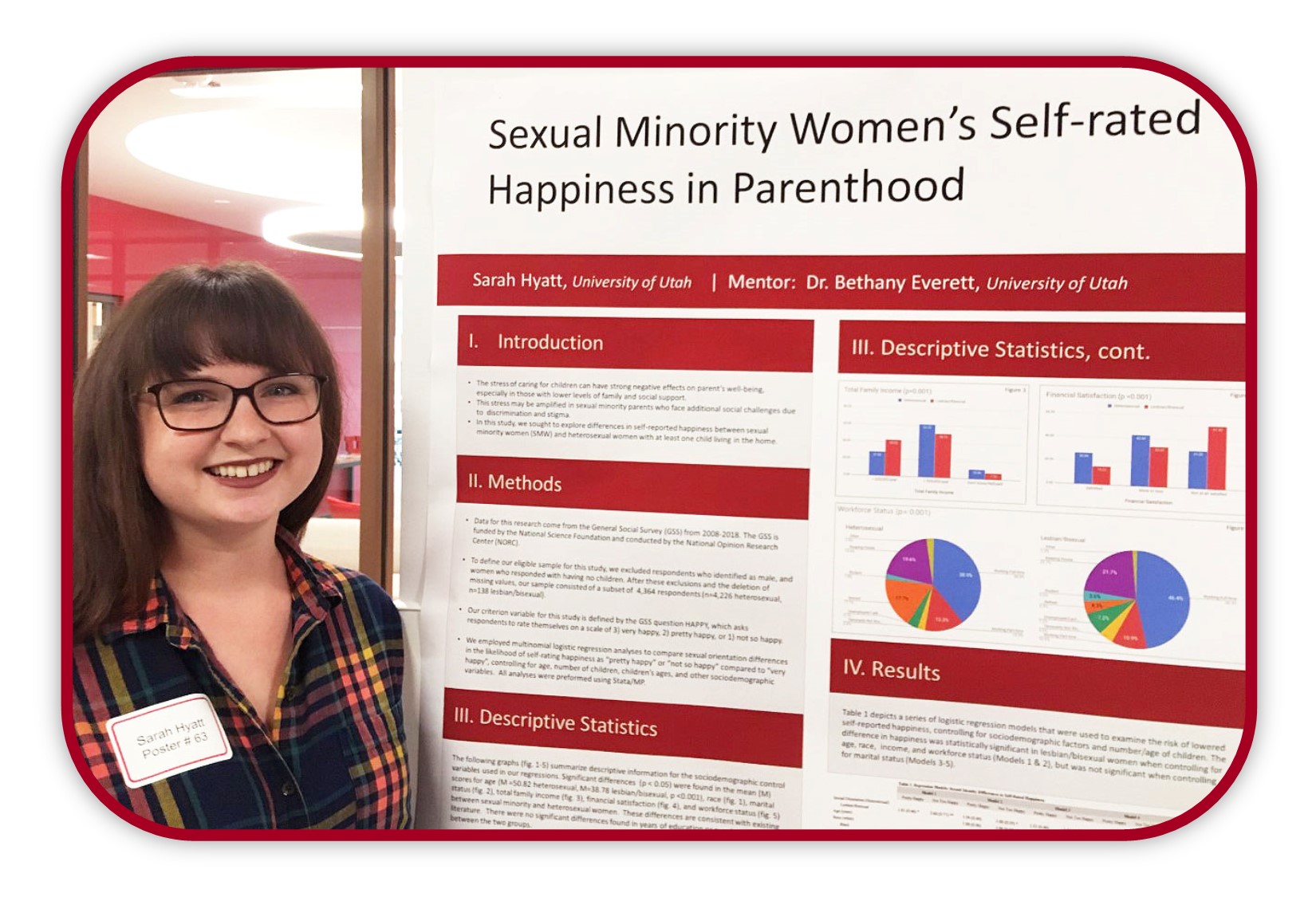 Sarah Hyatt, Bethany Everett “Sexual Minority Women’s Self-Rated Happiness in Parenthood”
Sarah Hyatt, Bethany Everett “Sexual Minority Women’s Self-Rated Happiness in Parenthood”
As a special project stemming from a course called Gender, Sexuality, and Health with Sociology Assistant Professor of Bethany Everett, Sarah Hyatt became interested in to what degree sexual minority women experienced discrimination and to what degree this affected their experiences of parenting. After controlling for other difficulty factors such as race and socio-economic status, Sarah found that there was still an impact on parental satisfaction for sexual minority women; however, whether the respondent was a single parent or had a co-parent had a deeper impact on parental satisfaction rating than the sexuality of the parent.
Navdanya Farm: Women’s Community Resilience & Ecofeminism in India
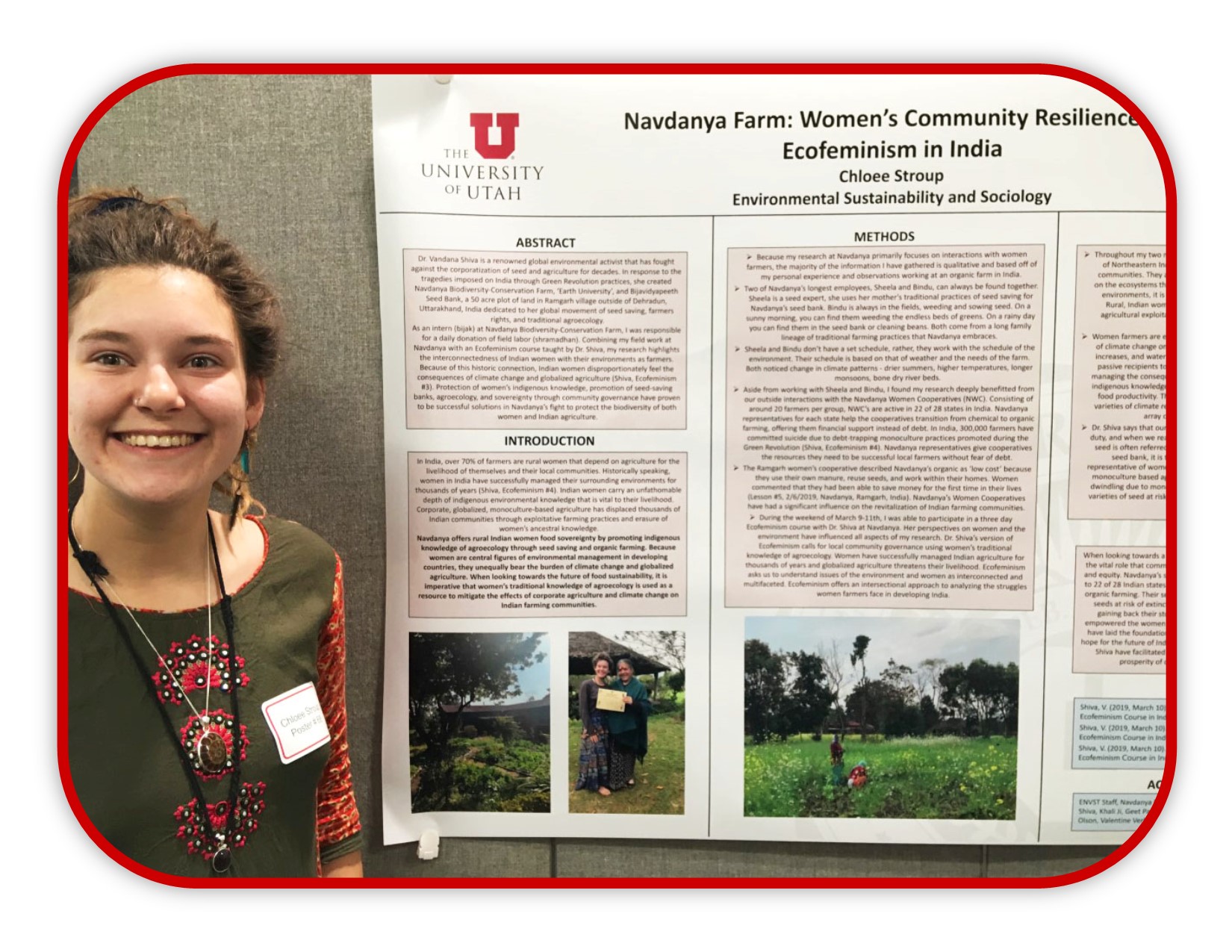
Chloee Stroup, double majoring in Environmental Sustainbility and Sociology, engaged in an experiential research project incorporating themes from both sociology and environmental studies. Chloee wrote a qualitative narrative about her experience participating in an internship on a working research farm in India that was part of an organization lead by Vandana Shiva, an Indian scholar, environmental activist, food sovereignty advocate, environmental activist and after globalization author. Part of Chloee’s internship required that she share the labor of the farm work with two women who were equipped with traditional Indian farming methods such as seed saving. Traditional methods, considered to be more sustainable than industrial agriculture methods, were continually tested as climate conditions fluctuate under climate change conditions stemming from fossil fuels. Chloee paid particular attention to both the environmental and sustainability oriented methods of Shiva and the farm workers as well as the social capital farm workers had with regard to their autonomy in decision-making in relation to Dr. Shiva. Chloee’s observation was that the farm offered an important research and empowerment opportunity for the women farm workers.
Three cash prizes are awarded for the best posters in each of the graduate research and undergraduate research categories. The Student Choice Award is given out to the student whose poster receives the most votes during the main exhibition period.
There were 72 poster presentations. Seven of those were guided by Sociology faculty mentors or majors in Sociology. Presenters from the Department of Sociology included: Samin Panahi, Sociology graduate student; Callie Avondet, History and Sociology; Rebecca Higham, Sociology and Health, Society and Policy; Sarah Hyatt, Health, Society and Policy; Elizabeth Izampuye, Health, Society and Policy mentored by Sociology faculty meber, Akiko Kamimura; Noelia Juarez, Sociology and Health, Society and Policy; Chloee Stroup, Sociology and Environmental Studies.
Sociology students competed with students from nine departments and programs within the College of Social and Behavioral Sciences.
Sociology graduate students were among the judges fo the event: Bethany Gull, Scott Wood, and Kris Young.
Sociology Faculty judges included: Rebecca Utz and Kim Korinek.
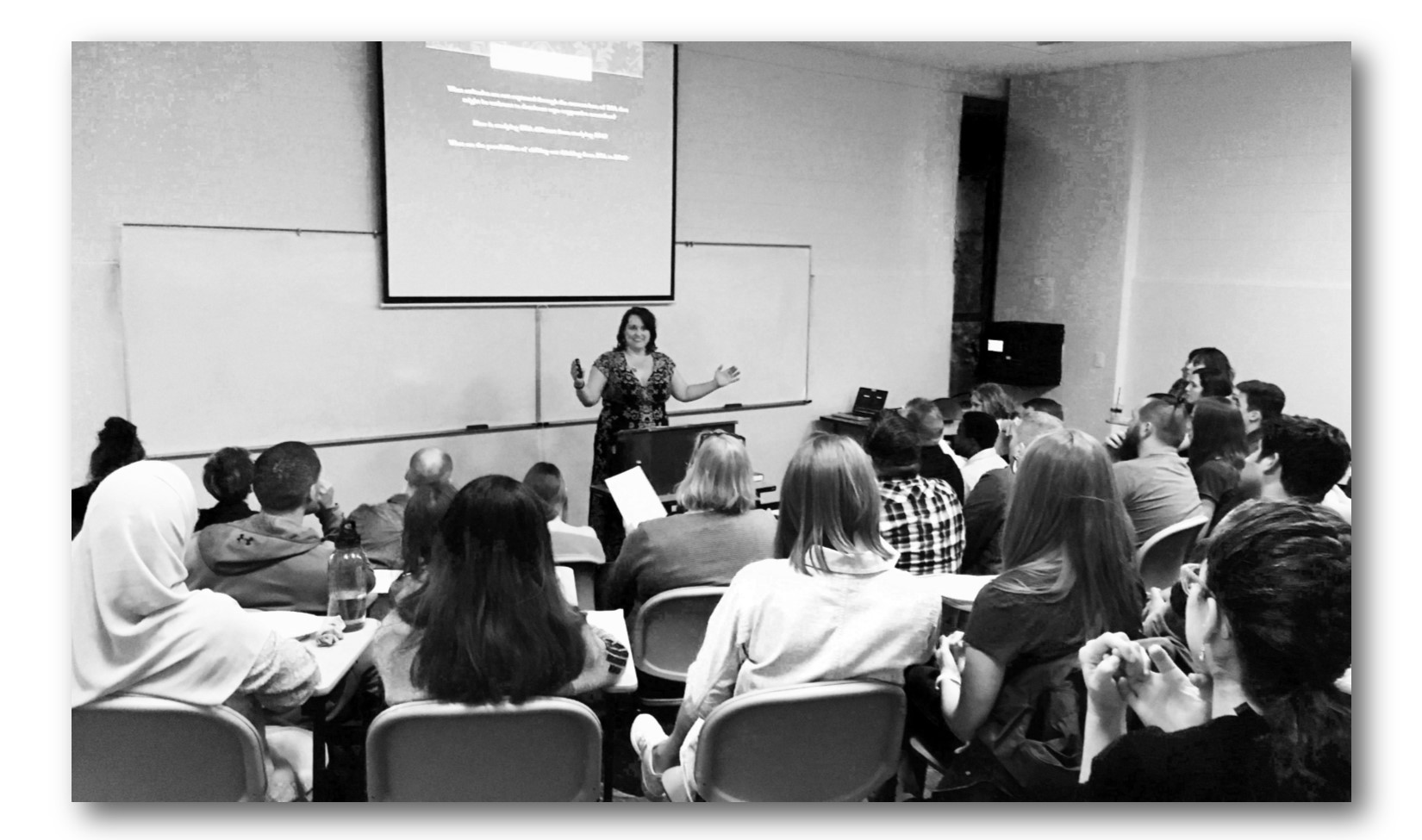
Ph.D. candidate shares dissertation research on "rape-resistant" attitudes as part
of the UofU Sociology Speaker Series
Preparing to defend your dissertation can be one of graduate school's most nerve-racking hurdles. The Sociology Department's Speaker Series provides a myriad of opportunities for department members to forge communities and engage with the newest thinking in the field. Whether the speakers come from other universities or are members of the U of U students and faculty, the Sociology Speaker Series provides platfroms for sharing new research. CoCo James, who describes her own journey to the Ph.D. program as one of "high-school dropout to doctoral candidate," presented her dissertation research ahead of her defense as part of the Sociology Department's speaker Series. The opportunity to present in the presence of mentors and an encouraging, supportive community is part of what makes the graduate research experience unique at the University of Utah. It's also an opportunity to learn from the questions audience members
Noting that "recent social and political events, such as the #MeToo movement, have
brought discussions about sexual violence, victim-blaming, and predatory behavior
to the fore of public dialogue in important ways," James noted that most research
had centered 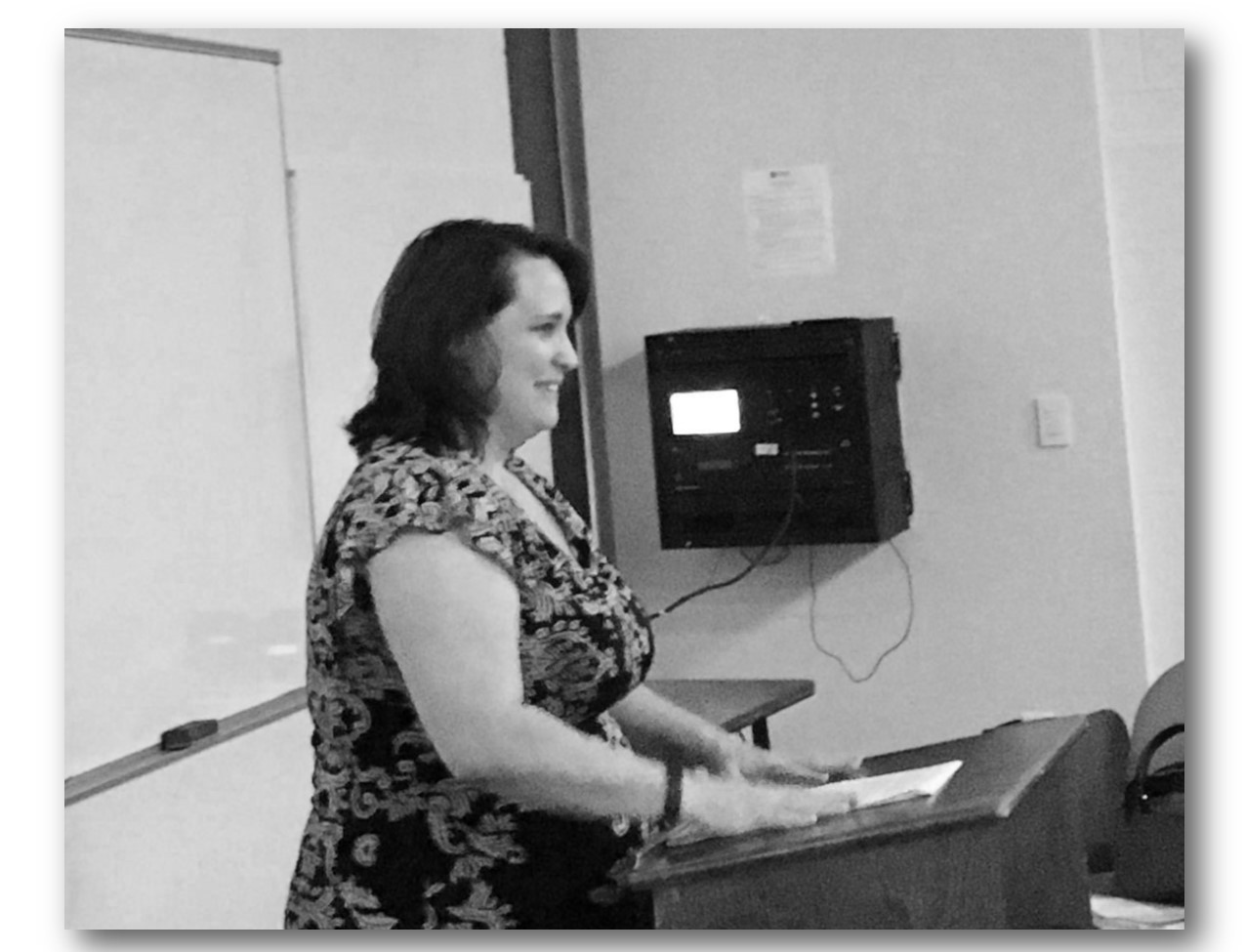 on "conceptual frameworks of rape myth acceptance and rape-supportive attitudes identified
in the 1980s." She acknowledged that it was "important work" and that it had "informed
the study of sexual violence to a great degree." And yet, what James found interesting
was that she had noticed through her research that there had been curiosity around
the question of whether there might also be "rape-resistant attitudes" and whether these attitudes could over time contribute toward decreasing
incidences of sexual violence.
on "conceptual frameworks of rape myth acceptance and rape-supportive attitudes identified
in the 1980s." She acknowledged that it was "important work" and that it had "informed
the study of sexual violence to a great degree." And yet, what James found interesting
was that she had noticed through her research that there had been curiosity around
the question of whether there might also be "rape-resistant attitudes" and whether these attitudes could over time contribute toward decreasing
incidences of sexual violence.
Although the question had been raised, the solution to the problem of how to study
it had not been solved. So, James's project involved, not only 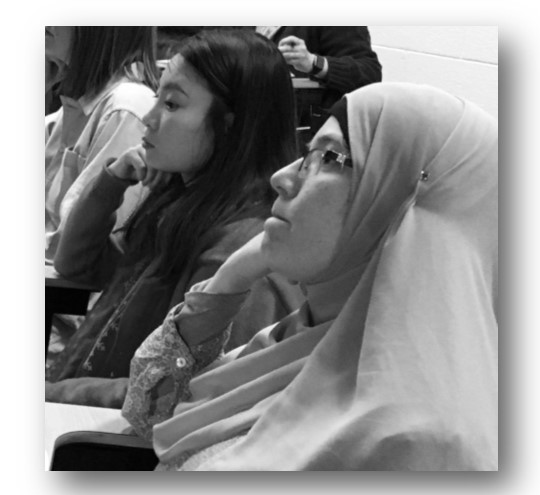 studying the questions, but also developing an instruments to test them.
studying the questions, but also developing an instruments to test them.
Having developed an appropriate metric and gathered survey data based on it, by the end of the study, James was able to form a descriptive narrative of features that may comprise a conceptual tool consisting of a constellation of attitudes that might make up what she refers to as a "Weberian ideal type," which is "not intended to construct a typology that is perfectly concrete, but rather one that is adequate in helping to conceptualize rape resistance ans an ideal pattern."
With new tools developed by James, researchers can now find out more about current, prevailing attitudes so that more can be learned in the future whether tehse attitudes might become more widely shared and whether that would decrease incidences ofsexual violence.
Jamesemphasizes that her study begins with the the focus being on potential perpetrators rather than potential victims, a relatively new approach in the field since "a review of 21 rape-prevention programs across the country revealed that only two were developed to influence potential perpetrators rather than potential victims"
And yet this shift in approach was necessary given that the prior approach did not work and had been unduly influenced by attitudes of victim blaming. According to James,
"Teaching potential victims to avoid rape by following a set of protective practices not only does not work, but also does nothing to reduce rates of rape...Focusing sexual violence prevention efforts on potential victims feeds victim blaming narratives, promotes the idea that rape is an easily preventable crime, and that survivors can eliminate sexual violence by never being targetable"
The process of exploring what other researchers and experts considered to be rape-resistant attitudes was an eye opening journey in itself. James described the discovery as, "thought-provoking, hard-hitting, deeply powerful conceptual tools that offer a great deal of insight into the social problem of sexual violence. They ... hold the potential to shift conversations about sexual violence prevention to what works."
Where can social science majors find inspiration and career advice?
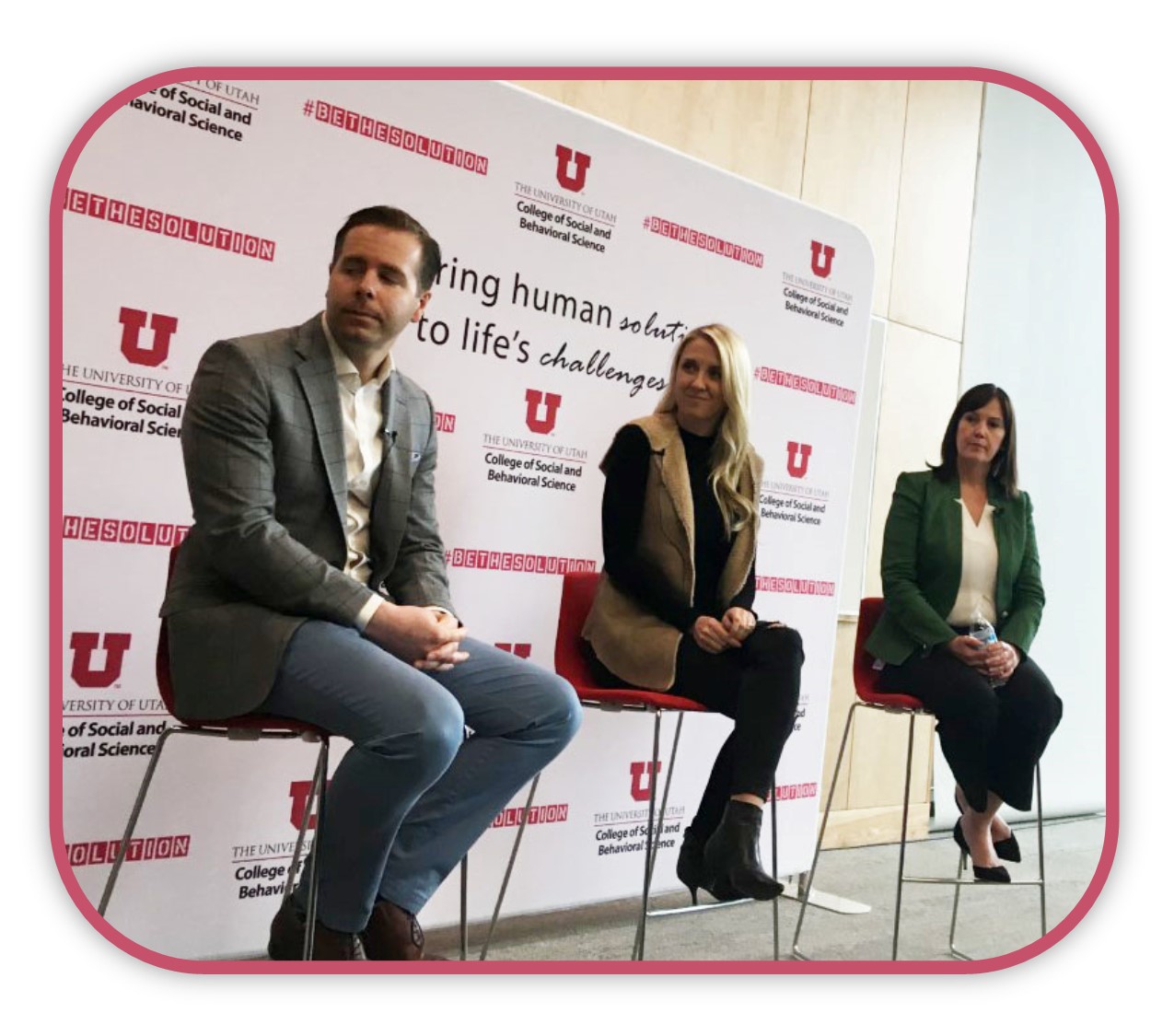 The College of Social and Behavioral Science hosts "Degrees to Everywhere" events where students have the opportunity to get to know alumni who have overcome
obstacles and found satisfying work experiences built on their degrees in the social
and behavioral sciences.
The College of Social and Behavioral Science hosts "Degrees to Everywhere" events where students have the opportunity to get to know alumni who have overcome
obstacles and found satisfying work experiences built on their degrees in the social
and behavioral sciences.
Sociology majors consider career paths after their beyond the academic route
Overcoming obstacles- mentors, colleagues
Advice to students
Get inspired
Three young alums share how their degree in a social science inspired their journey to success
For Jason Ware, (a 2006 graduate in Economics) now the Chief Investment Officer and Chief Economist & Partner of Albion Financial Group, a degree in economics was, at first, a straightforward path to working in the finance industry. Less than a year into his first position in finance; however, a financial crisis hit. Out of work and with the whole financial industry in an uproar, the experience threw into relief his sense that there was a greater need to protect investor’s assets through responsible and accountable incentive structures. Drawing on the education and principles developed as a student in the University of Utah Economics department, Ware went looking for a home for his ethics and values. He found people with like-minded commitment built into their business philosophy at Albion Financial Group where he serves as Chief Investment Officer and Chief Economist and Partner. “I found that at Albion, there was a focus on the client which was something that seemed like was getting lost in so many other investment firms.”
Lindsay Hadley wanted to develop concert series that could generate income for charity
fundraising. She began simply by using her best judgement and planning to organize
a large concert event for a charity organization client. To her dismay, although
her decision-making seemed sound on reflection, her first concert lost money rather
than earning a profit that could benefit her client’s charity, “I was just devastated
that ended up in debt and owing my client money instead of being able to hand over
what I thought would be a great bonus for them.” Looking for answers for what she
might have done differently, Hadley mustered the courage the second in charge at Coachella
Valley Music and Arts Festival, Rather than reaching out to the top promoter of the
festival, Hadley revealed her secret for finding the right person. “Reach out to the
2nd person in charge, she nodded, “the first person may be a great communicator, but
they may not know all the inner workings on the day to day level. It’s the second
person in charge who can really help you.” She called her prospective mentor, “out
of the blue” and asked if he would be willing to give her some advice on how to succeed
in hosting music shows. It was from him she learned that Coachella lost money for
a few years before becoming the most profitable music festival in the U.S., and that
“all shows lost money” at first. With his advice, she was able to plan for the lean
years and move forward to building her dream organization. “Look for a mentor. Don’t
be afraid to reach out to someone who has succeeded at doing what you’re trying to
do.”
Lindsay Hadley, (a 2006 graduate in Sociology) now Founder/CEO Hadley Impact Consulting,
wanted to develop concert series that could generate income for charity fundraising.
She began simply by using her best judgement and planning to organize a large concert
event for a charity organization client. To her dismay, although her decision-making
seemed sound on reflection, her first concert lost money rather than earning a profit
that could benefit her client’s charity, “I was just devastated that ended up in debt
and owing my client money instead of being able to hand over what I thought would
be a great bonus for them.” Looking for answers for what she might have done differently,
Hadley mustered the courage the second in charge at Coachella Valley Music and Arts
Festival, Rather than reaching out to the top promoter of the festival, Hadley revealed
her secret for finding the right person. “Reach out to the 2nd person in charge, she nodded, “the first person may be a great communicator, but
they may not know all the inner workings on the day to day level. It’s the second
person in charge who can really help you.” She called her prospective mentor, “out
of the blue” and asked if he would be willing to give her some advice on how to succeed
in hosting music shows. It was from him she learned that Coachella lost money for
a few years before becoming the most profitable music festival in the U.S., and that
“all shows lost money” at first. With his advice, she was able to plan for the lean
years and move forward to building her dream organization. “Look for a mentor. Don’t
be afraid to reach out to someone who has succeeded at doing what you’re trying to
do.”
Tanya Vea graduated with a BA in Sociology and BA Mass Communications. Began as a newscaster for KSL 5 TV and today works as the Executive Vice-President of News & Cross Platform Development for KSL 5 TV & KSL NewsRadio. She credited her sociology degree with preparing her to understand why certain stories were breaking such as the formation of the social movement around "Black Lives Matter." Combining sociology with communications prepared her well for the increasingly competitive journalism job market. She concurred with Lindsay Hadley that networking was the key to learning the hidden factors of success. The CEO of a competitor news organization was willing to share with Vea where her organization stood in the rankings and some factors to consider in reaching wider audiences. “Look for a mentor, Vea told students, "Don’t be afraid to reach out to someone who has succeeded at doing what you’re trying to do.”
Artistic performers mount the stage to support the Sociology Community Scholarship Fund
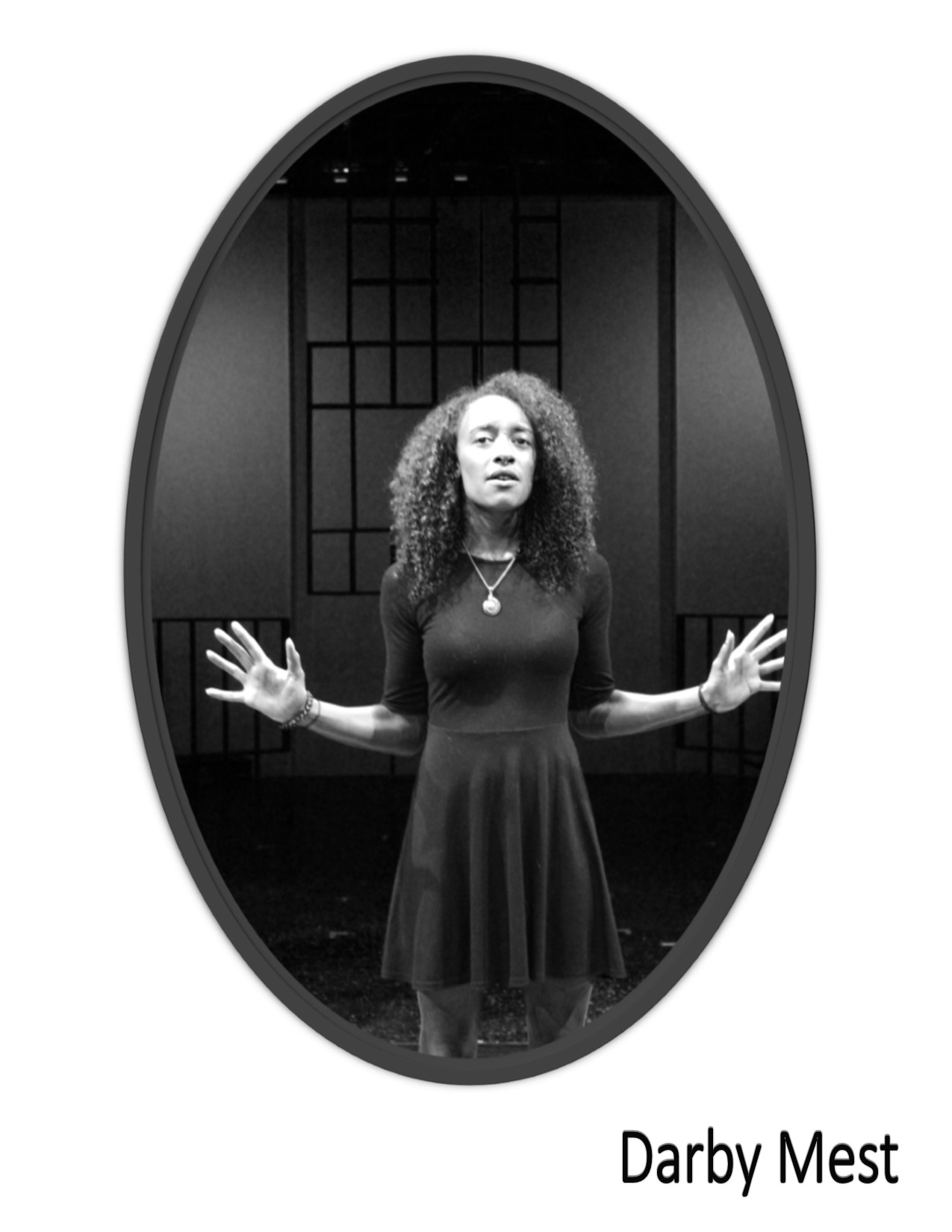
The Sociology Department in cooperation with campus and community sponsors held an evening of performing arts to build our Sociology Community Scholarship Fund to expand much needed support to underserved students studying in our department. On 11 September 2018, the Salt Lake Acting Company generously lent their stage to host, Sociology + U Benefit | Performance Art on Race, Class and Gender.
Darby Mest presented interpretive monologues by Ntozake Shange and Maya Angeolu.The evening featured original spoken word performances by Ciria Alvarez, Saia Langi, and Jarred Martinez on themes of immigration, identity, and social forces of oppression and resistance. How it feels to be invalidated or invisible as an immigrant as well as the details of cultural gifts and lessons received from an a mother who had survived a perilous migration journey.
A hush came over the audience, as if holding their breath, as Dee Dee Darby Duffin
began to sing Billie Holliday's "Strange Fruit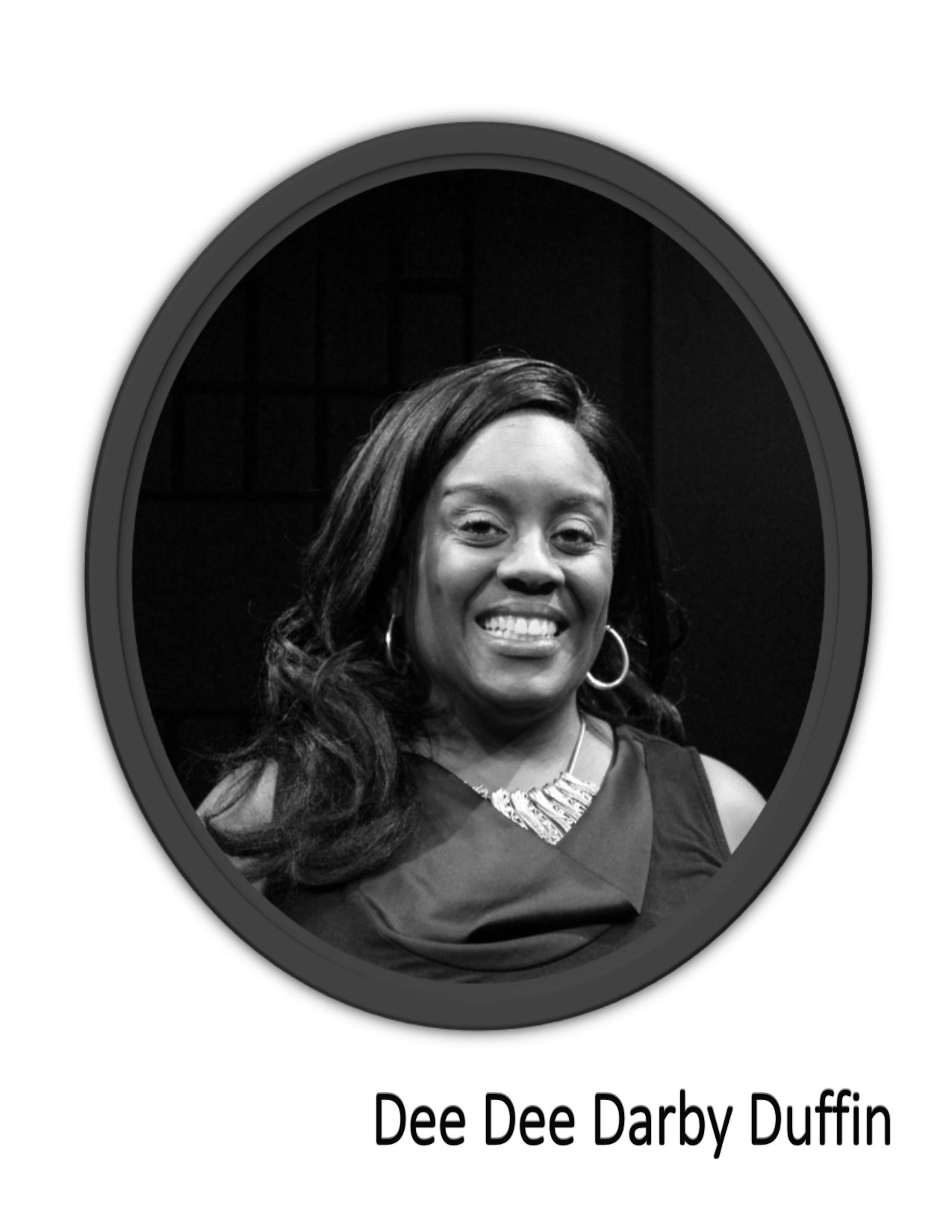 ." By the end of the blues ballad evoking lynching in the Deep South, the hush lingered
as the audience seemed to absorbing the last strains as they faded. The musical mood
lifted as Mana Academy's chorus of young Pacific Islander women sang to the accompaniment
of guitar and ukelele musicians.
." By the end of the blues ballad evoking lynching in the Deep South, the hush lingered
as the audience seemed to absorbing the last strains as they faded. The musical mood
lifted as Mana Academy's chorus of young Pacific Islander women sang to the accompaniment
of guitar and ukelele musicians.
After the performances, Professor Theresa Martinez engaged the audience in a discussion about the themes presented in the performances, themes that are the subjects of sociological study giving concrete weight to the artistic performances.
Sociology students today frequently face increasing obstacles to completing a degree.
First generation college students, students from low-income families, and underrepresented
students sometimes become overwhelmed by the burdens of working their way through
school and costs of furthering their educations, despite having many promising qualifications.
The Sociology Community Scholarship helps relieve some of the financial burden for
these students, allowing them to complete their degrees in a timely manner and achieve
their goals and dreams.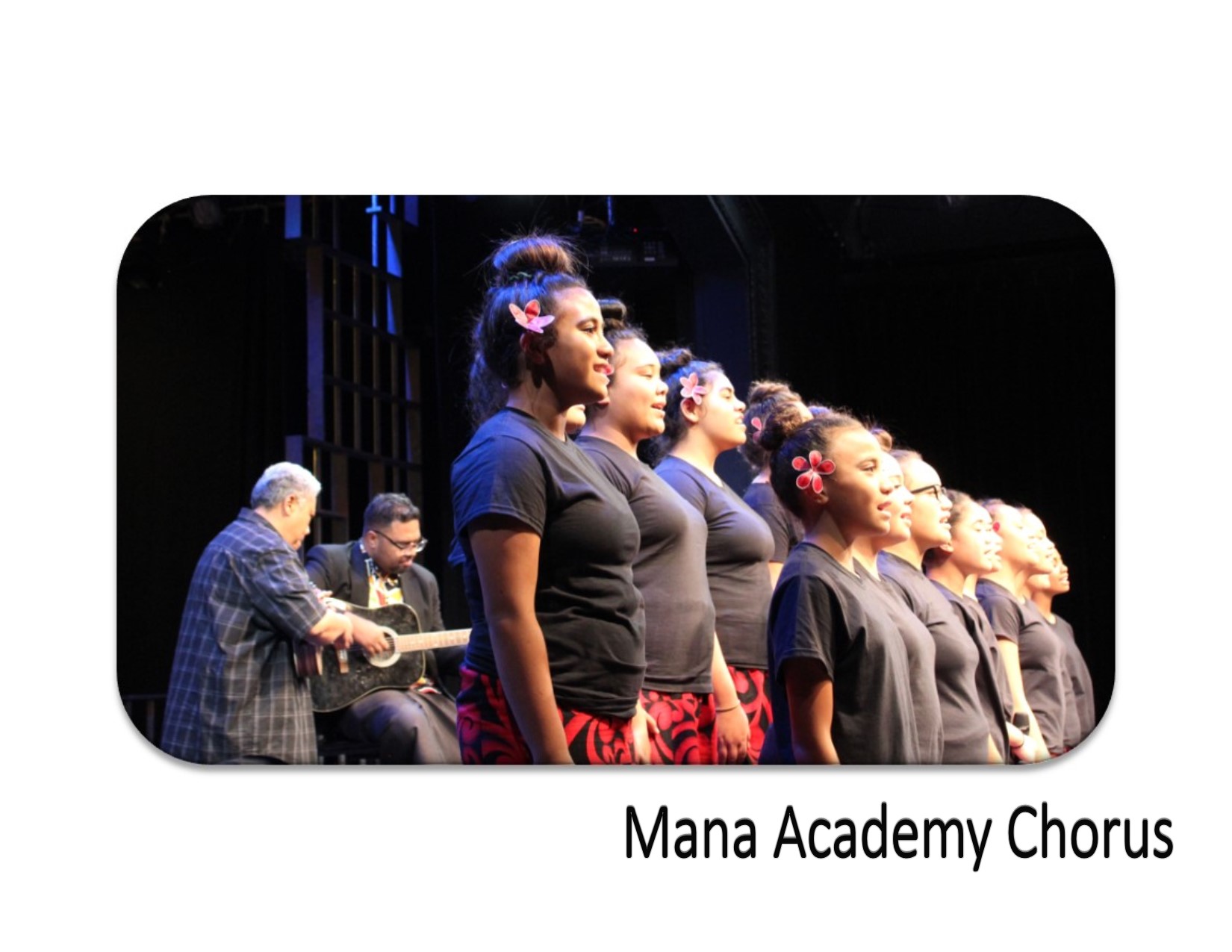
Celebrating Community Scholarships
Majors in Sociology are among the most diverse student communities at the University of Utah. Many are first generation college students, students from low-income families, and students from underserved and underrepresented communities. Despite a strong commitment to education as well as significant talents and abilities, each of these students faces unique challenges that place them at a high risk of being forced to leave the University before finishing their degrees. Losing these students is a great loss for the University because they have so much tooffer and to contribute to the campus community. The Sociology Community Scholarship is often the only
On 14 May 2019, Community Scholars came together to celebrate with sociology faculty, student supporters, and donors who together make the community scholar program a success. Community scholars shared their stories of difficulties overcome and their hopes for their education. Scholars like Thaiss Del Rio Sanchez, who credits the community scholarship as providing critical support to help her to achieve her goal to become an immigration attorney or non-profit leader with skills and resources to "fight for the rights of underrepresented groups in the United States." A Community Scholarship not only provides financial support that allows students to work fewer hours and concentrate more fully on their studies, but, according to Sanchez also, acts "as a constant reminder that there are people out there who support me, who see potential in me and who want to help me and other who are in my position succeed." Donors whose generosity make the Community Scholarship possible, were heartened when hearing the impact their contributions made on the lives of students, "Thank you for believing in me and investing in my future and eduation."
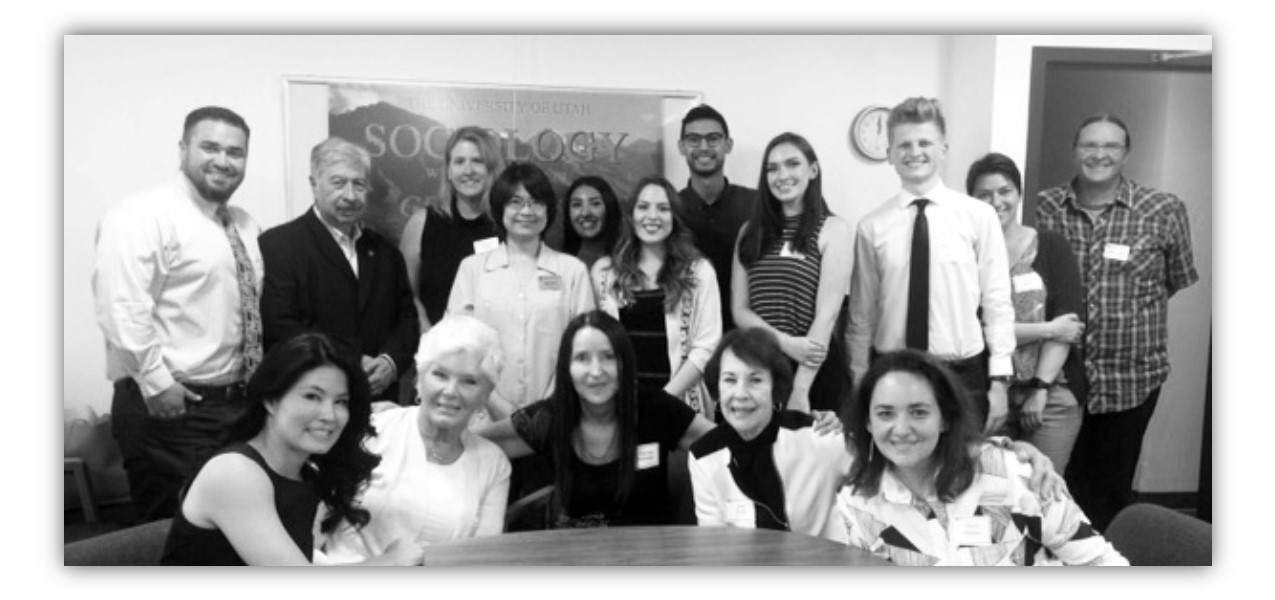
Community Scholarship Recipients: Diana Ramirez, Thaiss Del Rio Sanchez, Kristen Kessler,
Roarke Cullenbine, Whitney Fry, Olivia Mauchley, and Sierra Bullock. Donors included
Sandra Eberhardt, Joan Smith, Aaron Quarnberg as well as Robert Rendon and Angelina
Tsu of Zions Bank.
MAKE A GIFT TO THE SOCIOLOGY COMMUNITY SCHOLARSHIP
Can art be a vehicle for research questions? Sociology students propose the possibility in an exhibition/research project called, We are the Shadows: What do you think about Inequality & Immigration?
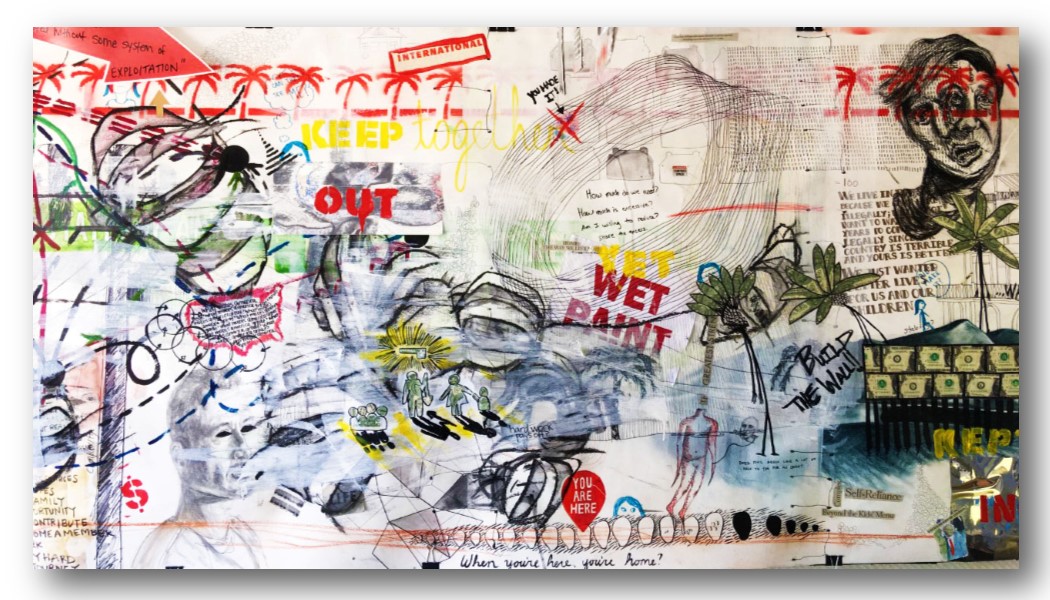
Ordinarily, sociological research and study is conducted by survey and data analysis which lead to published articles, books, lectures, talks, and presentations. While those forms are still the flagships of the field, other modes of inquiry and expression are finding their way into dialogue with sociological themes. Students engaged with the study and lived experience of migration produced an art exhibit expressing common views both supportive of and hostile to immigration. The exhibit was hosted inside a shipping container and featured several large boards covered in drawings and statements quoted from various views within current U.S. and Utah culture. Viewers were invited to linger over the drawings and writings and consider the views expressed through quotes. Viewers were then invited to take a pin and place it beside those statements with which they agreed or disagreed. In this way, the exhibit became a creative form of data collection and survey as well as an artistic representation of opposing social views. A standing poster outside the shipping container presented the anonymous collective artist/researcher statement which is included in its entirety below (Artist Statement/About this Exhibit).


A R T I S T S T A T E M E N T
A b o u t t h i s E x h i b i t
Growing inequality characterizes our world. Against the backdrop of globalization and rapid technological advance, we are increasingly divided between those living comfortably and those leading precarious lives – without a job or a secure livelihood, and maybe even working long hours but still teetering on the edge of poverty.
This exhibit reflects a year-long effort to understand the causes and consequences of growing inequality, and how inequality relates to debates and experiences around immigration. To connect these global issues to our local context, we talked to Utah residents- immigrants and the native-born-as well as representatives of government and non-profit organizations.
We also read a lot. We were struck by what sociologist Arlie Hochschild called a “deep story.”: a narrative metaphor that she developed to capture the precarious experiences and worldviews of Tea Party supporters in Louisiana. Hochshild’s deep story left a profound impact. It was both disturbing and powerful. It also clashed with our own worldviews and political orientations.
To dig deeper into the issues of inequality and immigration, we decided to gather and share the stories and experiences of people living in the Salt Lake valley. Building on Hochschild, we wrote two new “deep stories” and took them into the community. The quotes presented in this exhibit capture how people responded to the two deep stories, titled “The House on the Shore,” and “The Oasis in the Desert.”
The map on the back wall shows the areas we surveyed. We focused on capturing the views of residents who live on both the West and East sides of the Salt Lake Valley. Among the quotes, blue background refers to West side residents and orange background to East side residents.
The two large canvases engage with two deep stories. They represent a collaborative project with a class of art students at Brigham Young University. Our meeting grew out of an early trip to Fairview, in Sanpete County, to learn about how rural Utahns experience inequality and globalization. Each class began with one of the canvases. After a few weeks, we swapped canvases and went back to work, adding to what the other class had done.
We hope that this exhibit will further conversations about inequality and immigration. As you take in what others are saying, please share your own reactions in the open space, and use the pins to register your agreement or disagreement with the quotes. Thank you for coming!

